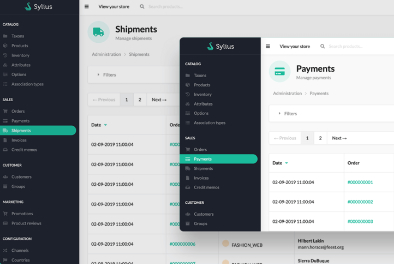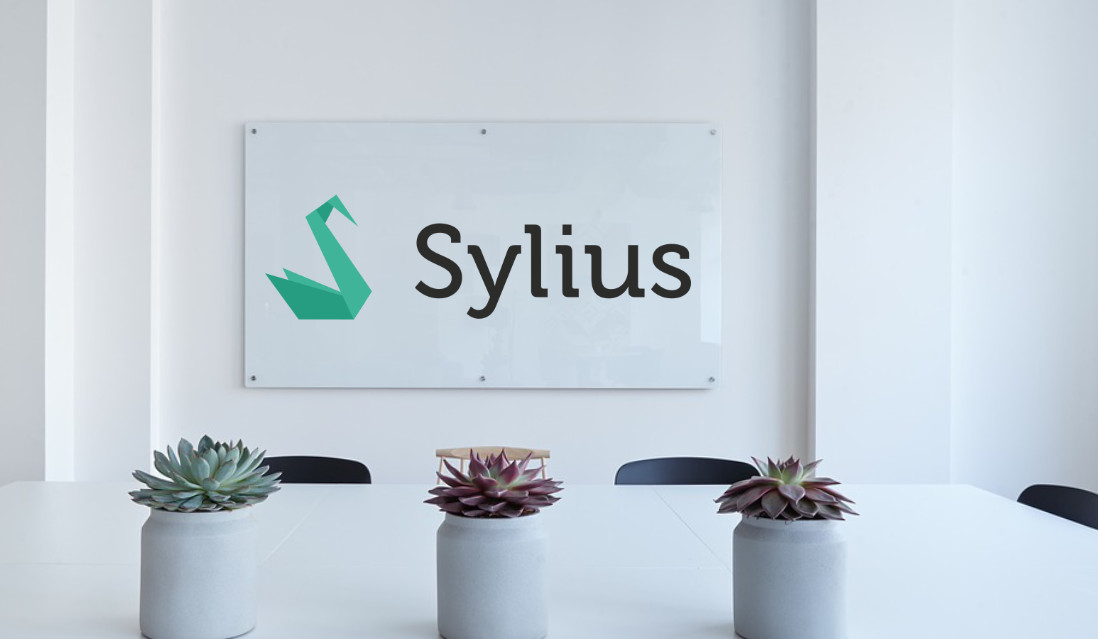Sylius vs Magento – can it be an alternative solution?
Having recently celebrated 5 years in the eCommerce ecosystem, we can say that Sylius has crossed a very important milestone. That’s why we thought that it would be a very good idea to present some key findings about it, and draw a few comparisons with its (much) bigger and older competitor – Magento.
If you want to find out more about our eCommerce projects, we are here to help.
Sylius is a headless open-source eCommerce platform built by a team of developers in Poland. Structured on top of the successful PHP Symfony framework, Sylius became really popular in Eastern Europe and France, and since its stable release, it has constantly grown to more than 3k downloads per day. Nowadays some of the top European companies are using Sylius for their online sales and the platform can proudly count over 2500 production instances.
Product versions
Sylius comes in two versions: Sylius, the open-source headless edition, and Sylius Plus, which gives you all the power of Open Source and comes with a set of enterprise-grade features and technical support from its developers.

If you have a strong IT team to implement and maintain the project, the open-source variant will offer a personalized solution for your stores, hosted in a local environment. You can use the functionality provided out-of-the-box or replace the integrations with your existing PIM, CRM, or Marketing Automation software. However, there are so many factors to consider, that, in our opinion, the open-source version is suitable only for testing if Sylius could suit your business, before purchasing the Plus Edition.
The Plus Edition comes with SLA-backed technical support, so it feels like having constant help to your inhouse development team, both during the development stage and after the go-live. The plan also comes with a dedicated Customer Success Manager to guide you through the implementation process. As part of the subscription, merchants will receive access to new features and security updates without having to pay any additional fees.
As you probably are aware, Magento is still the core engine for the more advanced Adobe Commerce, which uses AI and the machine learning system Adobe Sensei to offer a complex eCommerce solution. Despite all changes that happened in the last year, Magento continues to exist and thrive as an open-source variant, backed by Adobe and an army of more than 300000 developers, and benefitting from the same security and high priority quality fixes as Adobe Commerce.
Magento can be fully customized with thousands of extensions available in the marketplace, but it requires a strong IT team to do all the work. However,if your company can handle the development costs and you find it the best choice for your business, owning a Magento store will give you access to a whole world of unlimited possibilities.
The fact that potential users have the choice to try and test Sylius before upgrading to the paid versions scores good points with us. On the other hand, the struggle to find experienced developers able to handle a Sylius project seamlessly makes it look like a dip into the unknown, one that not many merchants are willing to take. Magento has been around for a few good years now and it has proven its capabilities far and wide. The costs for developing a Magento store are known to be pretty hefty, but at least, you can properly budget your project.
Price
Magento is indeed well-known as the ultimate tool in eCommerce, but it comes with a high price tag. Even if the open-source version is free to download, the cost of development can span from a few hundreds to over a thousand working hours. Add the fact that agencies charge between €40 to €150/h for Magento development and you can easily understand the magnitude of such a project in terms of costs.
Sylius on the other hand prides itself on having lower development costs, due to an easier learning curve for Symfony developers. In our opinion, entrusting your project to an inexperienced developer is a risk no one should take, as many agencies charge hourly rates, which could increase the total cost considerably.
If we steer away from the free versions and look at the commercial versions – Sylius Plus and Adobe Commerce – for both, the licence cost is based on GMV Gross Merchandise Volume. Sylius Plus will set merchants back around €14 900 – €72 900 / year.
It’s almost half the fees required for the paid version of Adobe Commerce, which can sometimes rise above the €100 000 / year mark. Is it worth spending the extra? All we can say is that Adobe Commerce is the ultimate tool in eCommerce. It uses AI and the machine learning system Adobe Sensei to analyze data and create personalised shopping experiences for each customer.
eCommerce Features
Magento’s capabilities are well known, but what our readers need to understand is that with the latest releases, all vendor-bundled extensions have been removed and will be available only for optional download from the marketplace. All basic requirements for complex online retail are present in the code base, and the marketplace features more than 3500 extensions that will turn your platform into the ultimate selling tool. If you want to learn more about the latest Magento version, you can read our article…

Sylius offers several features to make product management easier. These features include creating simple and configurable products, supporting product options such as size and color, and handling virtual products that do not require shipping. Additionally, Sylius enables unlimited product attributes such as collection, brand, material, and physical features.
To categorize and classify products effectively, Sylius offers a flexible taxonomy system with multiple category trees per channel. Sylius also provides the ability to moderate customer product reviews and set pricing per channel and multiple currencies with exchange rates.
Furthermore, Sylius allows product managers to set tax rates based on the address and product type, both included and excluded from price. It provides the option to choose a variant selection method, either variant choice or options matching.
Sylius also supports the management of associated types for products, such as similar products, and enables the preparation of product drafts and campaigns. Finally, catalogs batch import and export can be enabled as a separate but free plugin, to streamline product management.
Various features for Order Management and Customer Service are available, like viewing, editing and fulfilling or cancelling customer orders from the admin panel. Users can also send, browse, store and print invoices and have the ability to refund orders with credit memos. The dashboard is comprehensive and user-friendly. Those who choose Sylius Plus can manage the requested returns from their My Account section. They can also define multiple roles and permissions to control access to admin sections.
The platform offers an easy way to track the number of items available on hand and a flexible system for reserving the inventory at the cart, checkout or payment steps. With Sylius Plus users can also track the inventory from multiple warehouses, ship from the most optimal place and control the flow of returning goods to the inventories in Return Requests.
The search function is based on ElasticSearch and the platform also features Layered Navigation. Products can be filtered in categories and search results by price, material, color, and other attributes. Stock availability can be shown on product and category pages.
If you need to expand your business cross-border Sylius supports multiple currencies and exchange rates which can be syncronised from 3rd party sources. All content is translatable.
The checkout process ticks all requirements of modern eCommerce: it is clear, it shows tax and shipping estimates, the order summary, and allows customers to create accounts. A mini cart preview is available on store pages to summarize products cost in the cart.
Sylius enables modern marketing tactics, offering flexible cart and catalog promotions with customizable rules and coupons, including fixed or percentage discounts, prioritization, exclusivity, and channel/customer group targeting. It also provides crucial but basic SEO functionalities with media preview plus integration for Google Analytics and Google Tag Manager.
Security
Magento is one of the most secure eCommerce platforms out there, with security patches released frequently. In fact, the latest release brought 250 new fixes that bring many enhancements in security, performance, and platform usability. The security fixes help remove RCE and XSS weaknesses, as well as an improved ReCaptcha coverage.
Sylius also treats every security issue seriously, and releases updates regularly to address any vulnerabilities. The platform is PCI compliant, and can be integrated with multiple payment gateways, including Mollie, PayPlug, PayPal, Stripe, Adyen, or with your custom payment gateway. It also accepts bank transfer payments and cash on delivery.
Technology
Both platforms use some of the latest cutting-edge technologies.
Zend and Symfony are the frameworks used by Magento, with Apache and NGINX web servers coupled with a MySQL database, making it fast and reliable. The new release has brought Magento open-source support PHP 8.1 and all project libraries and dependencies have been updated for compatibility with PHP 8.1. Considered a major update, PHP 8.1 brings a lot of new features like enums, readonly properties, explicit octal numeral notation, first-class callable syntax, pure intersection types, never return type, final class constants, and a consistent performance improvement, namely a 23% speedup in Symfony Demo.
Sylius is an Open Source Headless eCommerce Platform based on Symfony, the high performance PHP framework for web applications. Thanks to Behat, Sylius is built on strong BDD fundamentals (Behavior-Driven Development)
The frontend is Twig-based. If you prefer otherwise, Sylius comes with a powerful REST API and can be customized to work well with the frontend of your choice or your architecture of microservices.
Extensions
Being a well-established platform, Magento has a vibrant community dedicated to its advancement. Presently, the Marketplace offers over 3500 extensions categorized into groups like Accounting & Finance, Content & Customization, Marketing, Payments & Security, among others.
Its counterpart cannot pride itself with such impressive numbers, but there are already more than 400 Sylius plugins that allow it to extend the functionality of the platform. The extensions cover a wide area of features like Accounting and Finance, Content, Customization, Customer Support. There are even extensions that harness the power of AI to bring the platform to a whole new level. Also, being based on Symfony, it gives developers access to 2.000+ bundles that make it easier to implement new features and integrations.
Support
The open-source versions of both platforms benefit only from support from the communities. As Magento has a vast global network of 1,150+ solution and technology partners and a highly active global community of more than 300,000 Magento developers, you can easily understand why there is a weak chance that any questions you might have will remain unanswered.
Sylius cannot boast of the same high numbers. There are about 4k + Sylius developers but they also count on a Symfony community of more than 600k+ developers, who might be able to help.
The commercial versions offer an extended level of support. Those who have used Adobe Commerce (the commercial version for Magento open-source) can say that customer support is one of the most exclusive systems among eCommerce platforms.
Sylius Plus offers a dedicated Customer Success Manager. At the same time, their support teams promise to resolve the issues you might encounter in a maximum of 24 hours. For challenging and mission-critical projects, they will contribute with their expertise accumulated from many Sylius implementations through a dedicated service called Project Success Assistance.
Conclusions
Both platforms offer the latest technologies in terms of eCommerce software. The difference stands in the plugins area and in the number of highly trained certified developers.
With Magento, complex native capabilities are complemented by thousands of extensions and that makes it suitable for every type of eCommerce business. However, it is well known that the prices for implementing and running a Magento project are usually pretty high, which might not make it suitable for small businesses.
Sylius is young, stable, user-friendly, and might score high with small and mid-market brands that need custom solutions. Its plugins cover anything a normal eCommerce business might need, but with the online retail world becoming more and more competitive, providing an edge, gaining advantage through out of the box features will definitely win customers over.
With Magento, merchants will find plenty of highly skilled developers to do that. As opposed, the Sylius community is limited and although they pride themselves with a short learning curve for experienced Symfony developers, many merchants will find this a pressing problem. Another fact that merchants will have to bear in mind is that they cannot modify or implement new features on their own but they can propose their preferred solutions to the owner of the platform.
If you want to know more about our list of services at Clever++, please visit our website.




